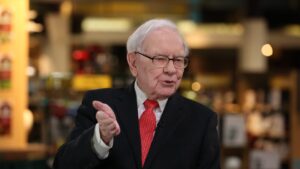Navigating the Storm: Warren Buffett’s Insights on Trade Wars and Tariffs
At Extreme Investor Network, we constantly strive to provide our readers with unparalleled insights into market dynamics and investment strategies. Today, we turn our attention to one of the most significant voices in investing: Warren Buffett. Known as the "Oracle of Omaha," Buffett has a knack for distilling complex economic issues into clear, actionable advice. In recent years, his thoughts on trade wars and tariffs have become increasingly relevant, particularly against the backdrop of evolving U.S. trade policies.
The Trade War Conundrum: Insights from Buffett
In the wake of former President Donald Trump’s tariff threats, concerns have surged around the potential for a renewed trade war. Buffett, a stalwart of free trade, has voiced his apprehension multiple times over the years. During interviews in 2018 and 2019, he articulated that aggressive tariff policies might not only lead to domestic inflation but also destabilize global economic relationships. "If we actually have a trade war, it will be bad for the whole world… everything intersects in the world," Buffett asserted in a CNBC interview, underlining the interconnected nature of modern economies.
Free Trade: A Pillar of Prosperity
Buffett’s endorsement of free trade stems from its ability to foster economic growth and improve living standards globally. He explained, "A world that adjusts to something very close to free trade… more people will live better than in a world with significant tariffs and shifting tariffs over time." This assertion points to an important fact: tariffs can limit consumer choice and escalate prices. In this sense, tariffs are "a tax on consumers," as Buffett states. They alter purchasing behaviors, shift manufacturing locations, and ultimately impact how much consumers pay for everyday goods.
Imagine the clothes you wear: if all were manufactured in the U.S. due to strict tariffs, the costs would likely be astronomical compared to what we experience today. The invisible benefits of free trade are felt in our wallets, even if we don’t readily recognize them.
The Educator-in-Chief
In the face of changing trade policies, Buffett emphasizes the need for leaders to communicate effectively with the public. He believes that any president must act as an "educator-in-chief." Drawing on historical precedents, Buffett cited Franklin D. Roosevelt during the Great Depression as a model for clear and effective communication. Leaders should elucidate how policy changes can have real negative consequences for the economy and consumers.
In the current environment, where words can provoke instant market reactions, clarity and rationale become even more critical. Given the potential for punitive retaliatory measures reminiscent of past trade wars, the risks of miscommunication are high.
What Lies Ahead?
As the landscape evolves with new administrations and policies, it’s crucial for investors to stay informed and adapt accordingly. The intricate dance of tariffs and trade can create both challenges and opportunities in the market. For astute investors, understanding the implications of these policies can provide a competitive edge.
At Extreme Investor Network, we encourage our readers to arm themselves with knowledge and insights, following the wisdom of icons like Buffett. By understanding the complexities of trade policy and its impacts on the economy, investors can make informed decisions and navigate the turbulent waters of the market with confidence.
By staying updated on these ongoing developments and embracing the philosophy of informed investing, you can position yourself for success in a rapidly changing economic environment. Let’s continue to explore the wealth of wisdom offered by great investors and apply those lessons to our own investment strategies. Happy investing!

